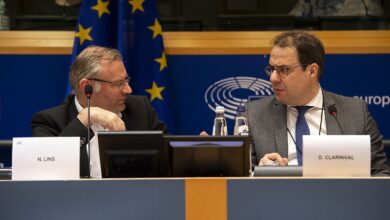Italy elections: Who has spent the most money on Facebook ads?

With just days until Italy’s general election, campaigning has intensified with parties holding rallies across the country.
Parties and candidates have also invested heavily in online ads, in addition to posters and billboards on the street.
A number of party leaders and candidates, including Go Italy (Forza Italia’s) Silvio Berlusconi, notably set up Tik Tok accounts in the run-up to the polls to appeal to younger voters.
In Italy, the biggest online audience may be found on Facebook, with around 38 million users, according to Statista.
Using Facebook’s own Ad Library, Euronews has investigated which parties and candidates have spent the most money on Facebook Ads in the last 30 days, from August 22 to September 20.
The Brothers of Italy (Fratelli d’Italia) – led by Giorgia Meloni and currently first in the polls – are the biggest spenders. The right-wing party has spent €119,311 on 73 political advertisements on Facebook its official page, more than €43,000 more than any other party or organisation.
After initially spending less than their political rivals, they have ramped up their online spending by targeting voters in central and southern Italy.
Meloni, in particular, is one of the most followed Italian party leaders on Facebook (having over 2.4 million) and a further €21,411 has been spent on Facebook Ads on her own official page.
In total, Brothers of Italy has spent more than €140,00 on Facebook ads in the last 30 days, more than humanitarian organisations such as Save the Children, Emergency and Unicef Italy.
The regions where all parties spent the most money on Facebook ads were Lombardy (€263,004), Sicily (€259,358), and Campania (€231,581).
Lombardy is the richest and by far the most populous region of Italy. Sicily and Campania, historically known for voting for right-wing parties, were mostly won by the Five Star Movement (M5S) in Italy’s last election in 2018.
Other members of the centre-right coalition in Italy also spent heavily on Facebook ads.
While the League’s official page invested only €6,000, the official page is its leader Matteo Salvini spent €62,655 on ads alone. Salvini is the most followed politician in Italy on Facebook and regularly spends money on online ads.
Severino Nappi, a regional councillor for Salvini’s party in Campania, has also spent €25,987 since August 22.
Similarly, Forza Italia spent five times as much money on ads for their leader Berlusconi than they did on the party’s official page.
Meanwhile, Coraggio Italia – a member of the Us Moderates group – spent a huge €59,305 on ads in the last 30 days
In total, the centre-right coalition spent more than €292,000 on Facebook Ads on the official pages of their parties or party leaders.
By contrast, the centre-left coalition invested around half as much in the same period (less than €149,000).
The More Europe (+E) party were the centre-left coalition’s biggest spender at €57,234, while the Democratic Party (PD) invested a total of only €46,540 and no money at all on the Facebook page of their leader Enrico Letta.
Among the leaders of major parties in Italy, Letta has the fewest number of followers on Facebook.
However, an unofficial Facebook page for PD supporters spent a further €27,603 on 8 Facebook ads in the last 30 days, while one PD candidate, Antonio Misiani, spent another €13,006 on online Facebook advertising.
The centre-right Civic Movement (IC) of Luigi di Maio and the populist M5S of Giuseppe Conte spent far more money on ads on their leader’s Facebook pages than their own.
In fact, the official page of the Five Star Movement has not invested in advertisements in the last 90 days.
Meanwhile, the leader of Italexit — Gianluigi Paragone — whose party does not have an official Facebook page, spent €7,364 on ads in the last 30 days.
Italy’s Data Protection Agency has recently asked Facebook to clarify its information campaign that targets potential Italian voters.
Meta says the initiative aims to counter interference and remove content that discourages voting, in collaboration with independent fact-checking organisations.
The social network will have to provide “detailed information” on their data processing methods to ensure the initiative only affects users aged 18 and over, the watchdog said.
A Meta spokesperson said that the company’s Italian election tools have been “expressly designed to respect users’ privacy” and comply with the EU’s strict data protection rules (GDPR).
“We are cooperating with the Italian Data Protection Authority to explain how we are working to help protect the integrity of the Italian election and to connect people with reliable election information from the Ministry of Interior”, the spokesperson added.
Read the full article here








